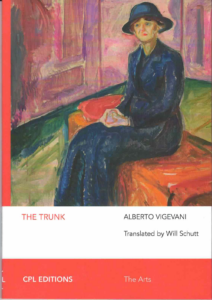The Trunk by Alberto Vigevani (translated by Will Schutt); New York: Centro Primo Levia, Inc © 2024; ISBN 9781841-046449; 81 pages; $20.

 SAN DIEGO – This short story by Alberto Vivegani in the form of a memoir was published by the Centro Primo Levi in furtherance of spreading knowledge about Jewish Italians’ lives and contributions.
SAN DIEGO – This short story by Alberto Vivegani in the form of a memoir was published by the Centro Primo Levi in furtherance of spreading knowledge about Jewish Italians’ lives and contributions.
Vivegani, as translated by Will Schutt, excels at narrative description. The trunk which is the namesake of this reflection was a stand-alone wardrobe which opened to reveal a closet on one side and drawers on another side. The book cover’s image is an early 20th-century painting by Edvard Munch of a lady sitting on such a trunk turned on its side.
Prior to dictator Benito Mussolini’s alliance with Adolf Hitler, Italian Jews had the ability to immigrate to the West or even to neighboring Switzerland, which maintained a German-biased neutrality. However, lugging the trunk, which Vigevani nicknamed “The General” was an arduous affair, especially because Vigevani was reluctant to depart his beloved Italy. Only after Mussolini’s government fell and a brief armistice was arranged did he fly to Switzerland with his wife and child.
After the Germans attacked Italy in a futile effort to prevent their previous ally from falling into the hands of America and its Allies, the Gestapo soon started imprisoning Jews and deporting them to Nazi death camps in Poland.
Vigevani, working on fragmentary information, envisioned the lives of his wife’s aunt Jole and her uncle by marriage, Giorgetto, who were imprisoned by the Nazis and ultimately sent to their deaths. Giorgetto slipped out of a fortress where he and his wife were imprisoned, wandering into a crowd of civilian workers who were departing the fortification. He describes Giorgetto’s joy at unexpectedly being able to breathe fresh air and, ironically, smoking a cigarette which he bummed from a civilian townsperson.
Then Giorgetto realized that he had left an ailing Jole, his wife of many years, inside the prison. He was struck with horror at the thought of leaving her alone.
The story is beautifully and hauntingly told.
*
Donald H. Harrison is publisher and editor of San Diego Jewish World.